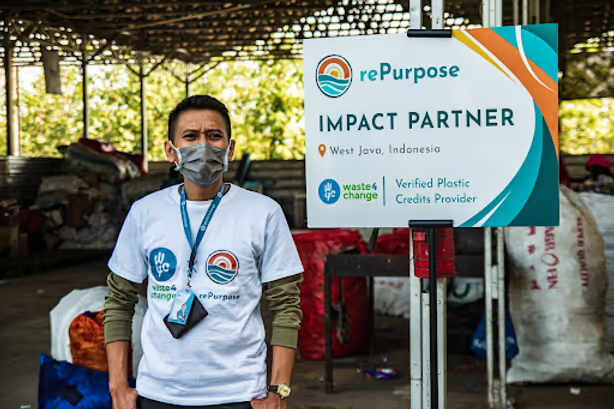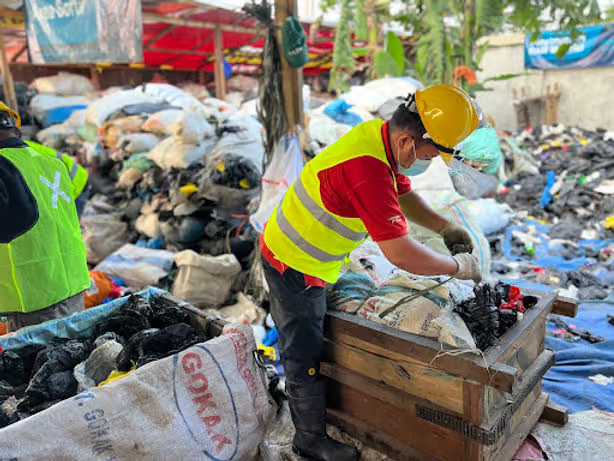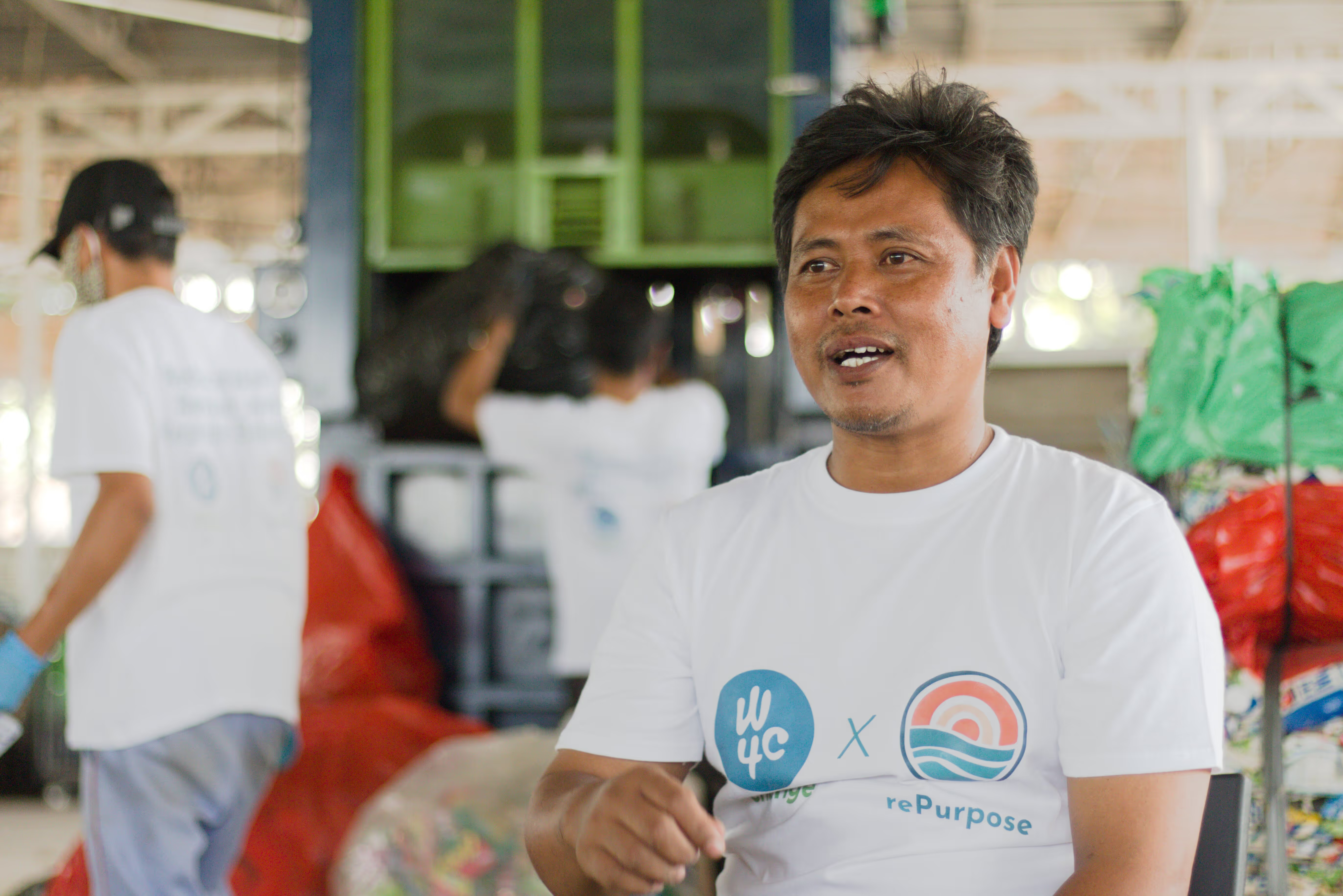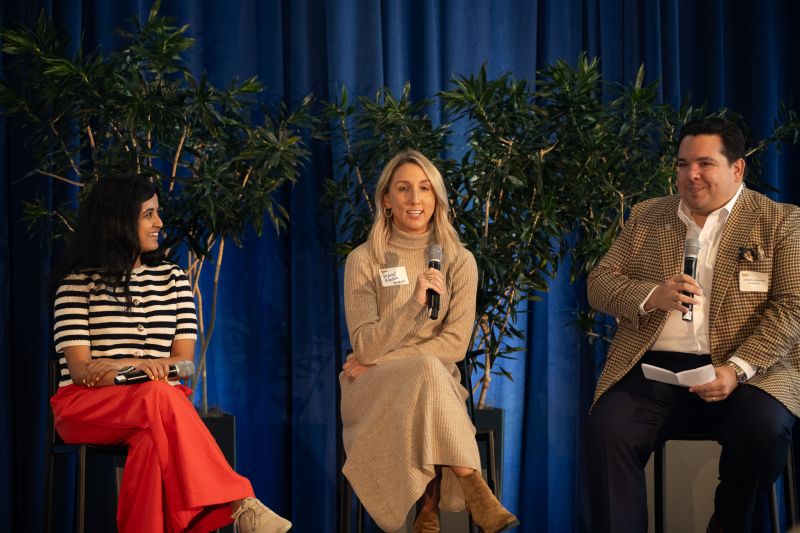This article was written as part of a series for Earth Day, with contributions from the Mananalu team. It was originally published on the Mananalu blog on 20th April, 2023. It is reproduced here with some small edits.
"I'm proud of the work that I do, because I believe I'm doing the next generation a great service." This is a quote from one of our waste workers - or as we like to call them 'waste warriors' - that collect and recycle waste for Mananalu's Drink One, Remove One impact program with rePurpose Global. In this blog, we'll explore how a bottle of Mananalu is not only fighting plastic pollution, but also part of a transformative effort to improve the lives of waste workers in Indonesia.
Many of us are aware of the urgent need to address the plastic pollution crisis. We've seen images of plastic waste washing up on beaches, polluting our oceans, and choking marine life. But have you given much thought about the people around the world who work to collect and recycle our plastic waste? Waste workers are critical to our efforts to reduce plastic pollution. Yet, there are up to 20 million informal waste workers globally, many of whom work in hazardous conditions for low pay, and without proper equipment or protection.
Financial lifelines
Did you know that informal waste workers are responsible for the majority of the world's plastic recycling? Informal waste pickers are responsible for the collection of around 60% of all plastics that are recycled. But despite doing more than any other group to prevent plastic contaminating the environment, these informal waste workers frequently live in extreme poverty. Without access to fair market prices for plastic, workers are typically financially exploited, and will often toil collecting scrap plastics for no more than a couple of dollars a day.
Every bottle of Mananalu supports rePurpose Global’s impact project, Laut Yang Tenang (‘Calm seas’ in Bahasa) in Java, Indonesia. The project is a collaboration with local implementation partner Waste4Change, and waste workers are central to the project. The workers collect and sort low-value plastic waste such as flimsy plastic bags, which is then aggregated and sent to recycling facilities.
One of the greatest super powers of every Mananalu bottle that you drink, is that it provides financial support for waste workers, and helps to alleviate cycles of poverty. Laut Yang Tenang, supports the livelihoods of over 200 informal workers, as well as 40 facility and franchise site workers. Mananalu’s incentivization of the collection of low-value flexible plastic bags, which were not previously collected and had limited market value, means an additional income stream has been created.
On top of that, waste workers receive fair prices for plastic collected, and employees at the project receive pay above the minimum wage, along with health insurance, social security, and other employee benefits.
This, along with further opportunities for related micro-entrepreneurship through a unique franchise model, has gone a long way to financially supporting the workers and their families. As the project continues to expand, these opportunities will open up to more workers, and will contribute towards the bridging of the poverty gap.

Better working conditions
Waste pickers around the world often work in hazardous conditions, sorting through piles of garbage with no protective equipment. This can have a serious impact on their health. Incidences of respiratory and skin disease are high, while deaths caused by landslides at waste dumps and exposure to landfill fires are not uncommon.
The dangers of waste management are particularly apparent at Bantar Gebang landfill in Bekasi on the Indonesian island of Java. Bantar Gebang is one of the world’s largest landfills. The trash pile stands at more than 15 stories high and 200 football fields in size. Thousands of tons of garbage come in from Indonesia’s capital city Jakarta every day, and thousands of people work to pick recyclable waste from the landfill. These waste pickers often work with no protective equipment, and they, and anyone living nearby, are at serious risk of health conditions.
rePurpose Global’s impact project Laut Yang Tenang is also located in Bekasi, and provides a safer, cleaner livelihood for workers. With Mananalu’s support, project workers are protected through rePurpose Global's Impact Code and social safeguards. For informal workers, rePurpose Global is working with Waste4Change to create a development program for informal waste workers engaged with the project, which includes training, needs-based support, and opportunities for medical care.
Employed facility workers are provided with protective clothing such as gloves and masks, as well as health and safety equipment such as first aid kits and fire extinguishers. They also benefit from improved working conditions, including ventilated facilities, set working hours with guaranteed breaks, drinking water and private sanitation facilities, and even support to set up bank accounts.
Compliance with rePurpose Global’s social safeguarding is maintained through regular checks, including through third party audits. The rePurpose Global team run annual bootcamps to support the project to find new ways to improve conditions for workers, and run training programs.

Dignity in work
Many waste workers in Indonesia belong to marginalized communities. There is a social stigma associated with waste collection, leaving waste workers frequently subject to rejection and humiliation, along with deprivation. It is often intergenerational, with children following their families into a life of scavenging for recyclables.
Instituting safeguards to improve the conditions of informal waste workers, is essential to turn this around. As above, every bottle of Mananalu contributes to more consistent income, as well as uniforms, equipment, health care, and bank accounts for workers. This helps to change negative perceptions of waste work, and build newly-found dignity, respect and self-confidence for waste workers.
Unfortunately, women who work in waste management tend to be disproportionately marginalized. Challenging family circumstances often impact women’s availability to work, and the problem of gender-based income disparity contributes to their vulnerability in this sector. Laut Yang Tenang has strict anti-discrimination policies, which include guarantees that female waste workers are paid the same as men for the same work. As such, Mananalu’s funding also contributes towards support of gender equality in the industry, and livelihoods for marginalized women.
One bottle, big waves
The work has had such a profound impact on the waste workers’ perceptions of their work, that it has led to increased environmental awareness in the community. In a recent interview, Laut Yang Tenang waste worker Sri Wihati Astuti spoke about how her attitudes had changed:"Since I worked at a waste bank, my love and awareness for the environment has grown. I can even teach my own neighborhood - especially my family - about the importance of valuable waste, so we can grow our love for the environment together."
You can watch the full video, from rePurpose Global’s brand partner Ocean Bottle, here:
The wave of change that consumers are part of by choosing Mananalu over a plastic bottle reaches way further than the USA. It's improving lives and environments in countries like Indonesia, where fighting plastic pollution is a part of people's everyday lives.



.avif)
.png)
.png)






